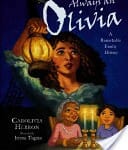 Immigration stories provide a useful portal into the traditional values of different cultures. Carolivia Herron used her background as a Jew of African descent to formulate the story line for her historical picture book-Always an Olivia: A Remarkable Family History (Lerner Publishing Group, Inc, 2007). The adventures of Carolivia’s ancestors were just waiting to be retold. Jeremy Tugeau’s colorful illustrations supplemented the narrative in a delightful way. The characters’ emotions and the settings were brought to life.
Immigration stories provide a useful portal into the traditional values of different cultures. Carolivia Herron used her background as a Jew of African descent to formulate the story line for her historical picture book-Always an Olivia: A Remarkable Family History (Lerner Publishing Group, Inc, 2007). The adventures of Carolivia’s ancestors were just waiting to be retold. Jeremy Tugeau’s colorful illustrations supplemented the narrative in a delightful way. The characters’ emotions and the settings were brought to life.
In the picture book, Carol learned from her Great-Grandma Olivia that part of her family resided in Spain during the Inquisition. To escape death, the family immigrated to Portugal where they were forced to hide their Jewish traditions from their neighbors. When their safety was once again called into question, they relocated a second time. This time they journeyed to Venice, Italy. One of the descendants of the family, Sarah, was kidnapped by pirates who took the girl to North Africa. The pirates hoped that wealthy Jews would pay a high ransom.
On the pirate ship, Sarah was befriended by James, a young man pretending to be a pirate. James developed a plan that enabled him to remove Sarah safely from the ship. The Tripoli Jewish community, secretly arranged for the two to board a ship bound for America. The captain of the ship left the couple with a group of freed slaves from West Africa who lived on the Georgia Sea Islands. Even though the young couple assimilated into the dominant culture and adopted the West African and American traditions of their neighbors, they continued some Jewish traditions such as lighting candles on Friday night before Shabbat (Jewish Sabbath) began.
Herron’s research revealed a possible explanation for the captain’s choice for disembarkation. In the 19th century, Jews were not considered Caucasian. It is the author’s belief that the captain felt it would be safer for the couple to live among free nonwhites.
The story can be enjoyed by all children. However, the historical components of the story will be better suited for upper elementary or middle school students.
Discussion Topics
- Spanish Inquisition
- Sephardic Jews
- Conversos- Secret Jews
- Jewish migration
- Maintaining family traditions
- Antisemitism
- Pirates
- Kidnapping and ransom
- Slavery during the time of the Bible
- American slavery in the 19th century
- Geechess (free slaves) on the Georgia Sea Islands
- Discovering family secrets
- Assimilation and intermarriage
- Tracing family roots
- Race designations (Jews not considered white until 20th century)
- Using family events to craft a story
- Historical fiction vs. nonfiction
- Writing stories based on actual events
Question
- Where is the line drawn between fiction and nonfiction?
Leave a Reply
You must be logged in to post a comment.